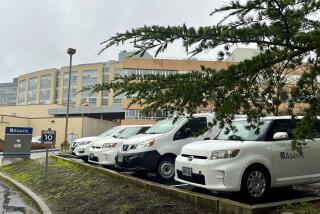News of Prior Baby Mix-Ups Stuns Officials
- Share via
ORANGE — State medical officials said Saturday that St. Joseph Hospital did not inform them about newly disclosed infant mix-ups and vowed to expand their investigation into practices at the maternity ward.
Barbara McGowan, a state investigator for the Department of Health Services, said she was “dumbfounded” to learn about the prior incidents, including one in which a mother breast-fed the wrong baby for 30 minutes.
“I would have hoped that we would have had some knowledge that this had happened,” McGowan said, adding that the department planned to send an investigative team back to the hospital early this week.
The action comes nearly a week after the hospital sent a newborn home with the wrong family on Valentine’s Day, and a day after officials acknowledged three other infant mix-ups in the last year.
A hospital spokeswoman defended the medical center’s actions, saying the early incidents were minor and did not need to be reported because they didn’t involve a “multiple-system failure.”
Besides the Valentine’s Day mishap, “we never had any incidents of babies being discharged to a wrong family,” said Katie Skelton, the hospital’s vice president of patient care services.
“The other circumstances brought to light now are individual situations, when [the wrong] babies are brought to mothers [in the hospital],” she added. “There would be no reason in the world to contact the Department of Health Services.”
The hospital fired two nurses after the Feb. 14 switch, and Skelton said Saturday that the same nurses were involved in the three other incidents.
The hospital intends to cooperate with the state’s investigation and has asked the Joint Commission on Accreditation of Healthcare Organizations to look into last Sunday’s incident, she said.
Additionally, the hospital announced Saturday that it is forming five teams of doctors, nurses and administrators who will undertake a top-to-bottom review of the newborn ward.
The teams will look at every step an expectant mother takes from admittance to discharge and review hospital procedures, she said. The teams will probe infant security, patient documentation and patient flow, as well as staff training and competency education.
“We’re going back and looking at everything and asking is our process the very best process and have we missed the opportunity somewhere? Did we make it easy for someone to make a mistake?” Skelton said.
At first, it appeared that the Valentine’s Day infant mix-up was a one-time mistake. But on Friday, a couple interviewed by The Times said that a nurse last June mistakenly gave their baby to another mother, who breast-fed the infant. After that, they said, St. Joseph Hospital assured them that new policies were adopted to prevent such switches.
Skelton said changes were enacted shortly afterward, including a ban on nurses taking two babies at a time to a shared room.
Two less serious incidents followed.
In August, a newborn was put in the wrong bassinet after circumcision. A nurse caught the error and corrected it before the baby was brought to his mother’s room, Skelton said.
Several weeks ago, she said, a nurse walked into a mother’s room with an infant, only to have the mother immediately realize that the baby was not hers. The nurse, who never gave the infant to the woman, quickly turned around and left the room with the child.
Brian Lambert, the Tustin father who went home last week with the wrong baby boy, said he and his wife were shocked about the newly disclosed mix-ups.
“It should have been taken care of [in June] when they said they were taking care of it,” Lambert said. “They told the other family they would fix the problem and they didn’t.”
Hospital officials said the mix-ups must be placed in proper perspective. The Lambert baby mistake was the first time in the hospital’s 70-year history that a baby had been released to the wrong parents, Skelton said. On average, about 5,500 babies are delivered a year at the hospital.
“Each mother is staying an average of 2 1/2 days. The interactions per mother with staff, bringing babies in for feeding, taking them out, is about 10 times a day, and 30 interactions per parent times 5,500,” she said.
“Three times out of a hundred-thousand interactions this happens, and that is the light you have to show this in.”
More to Read
Sign up for Essential California
The most important California stories and recommendations in your inbox every morning.
You may occasionally receive promotional content from the Los Angeles Times.














